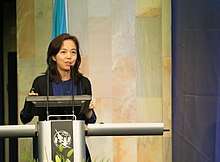AI for Good
The AI for Good Global Summit is a United Nations platform, centered around annual Global Summits, that fosters the dialogue on the beneficial use of Artificial Intelligence, by developing concrete projects. The impetus for organizing global summits that are action oriented, came from existing discourse in artificial intelligence (AI) research being dominated by research streams such as the Netflix Prize (improve the movie recommendation algorithm). [1] The AI for Good Global Summit series aims to bring forward Artificial Intelligence research topics that contribute towards more global problems,[2][3] in particular through the Sustainable Development Goals. The AI for Good Global Summit 2020 has been moved online. AI for Good is organised by the Standardization Sector of ITU (ITU-T).
| AI for Good Global Summit | |
|---|---|
 | |
| Venue | ITU, Palace of Nations |
| Location(s) | Geneva |
| Country | Switzerland |
| Most recent | 2019 |
| Attendance | 2800 (2019) |
| Organised by | ITU, UN and XPRIZE |
| Website | https://aiforgood.itu.int/ |
Global Summit 2020
The Global Summit 2020 was moved to online, including a series of webinars focused on using mobile phones for contact tracing was introduced.[4] Speakers include:
Global Summit 2019
The third AI for Good Global Summit took place from 28 May to 31 May, and gave rise to the ITU Focus Group on Artificial Intelligence for Autonomous and Assisted Driving with several Day 0 workshops and VIP events having taken place on May 27.[5]Some of the speakers included:
- Ray Kurzweil
- Cedric Villani
- Yoshua Bengio
- Anousheh Ansari
- Yves Daccord
- Vladimir Kramnik
- Klaus-Robert Müller
- Jean-Philippe Courtois
- Amir Ansari
- Francis Gury
- Petteri Taalas
- Houlin Zhao
- Soumya Swaminathan
- Eileen Donahoe
- Francesca Rossi
- Ingmar Weber
Global Summit 2018
.jpg)
The second AI for Good Global Summit took place from 15 to 17 May 2018 at the ITU headquarters in Geneva, Switzerland and generated 35 AI project proposals[6] including the ITU-WHO Focus Group on Artificial Intelligence for Health with the World Health Organization.[7][8][9] Speakers included:[10][11]
- Roger Penrose
- Liu Yang (astronaut)
- Samantha Cristoforetti
- António Guterres
- Michael Møller
- Tedros Adhanom
- Mukhisa Kituyi
- Bill Peduto
- Stuart J. Russell
- Thomas Wiegand
- Huw Price
- Stephen Kelly
- H.E. Ahmed Al Theneyan
- U.N. Envoy on Youth Jayathma Wickramanayake
- Ingmar Weber
The ITU also relaunched its Journal ICT Discoveries during the 2018 Global Summit, with the first edition being a special on Artificial Intelligence.[12]
Global Summit 2017

The first AI for Good Global summit took place from 7 to 9 June 2017. Speakers at the event included:[13] [14][15]
- Pedro Domingos
- Fei-Fei Li
- Gary Marcus
- Stuart J. Russell
- Jürgen Schmidhuber
- Rupert Stadler
- Manuela M. Veloso
One of the outcomes of the 2017 Global Summit was the creation of an ITU-T Focus Group on Machine Learning for 5G.
AI Repository
In order to further promote Artificial Intelligence and Machine Learning research that advance the achieving of the Sustainable Development Goals, an AI Repository was created, which includes AI for Good projects and examples.[16][17]
Related applications
Several similar terms have been used to describe related applications of AI to global issues. These include "AI for Earth", referring specifically to environmental applications;[18][19] "Humanitarian AI", referring to applications for humanitarian ends;[20][21] and "AI for Healthcare".[22]
References
- "AI for Good Global Summit 2018". 17 May 2018. Archived from the original on 2019-09-23. Retrieved 1 June 2018.
- Butler, Declan (2017-06-06). "AI summit aims to help world's poorest". Nature. 546 (7657): 196–197. doi:10.1038/546196a. ISSN 0028-0836. Archived from the original on 2019-04-30.
- "How Can We Optimize AI for the Greatest Good, Instead of Profit?". www.technologyreview.com. Retrieved 2018-06-29.
- "2020 Digital Programme". AI for Good Global Summit 2020. Retrieved 2020-08-07.
- "Day 1, 28 May 2019 Programme". AI for Good Global Summit. Archived from the original on 2019-11-05. Retrieved 2019-05-28.
- "ITU annual global summit generates 35 pioneering AI for Good proposals | OpenGovAsia". www.opengovasia.com. Retrieved 2018-06-29.
- Bradley, Simon. "AI has 'enormous' potential to transform health sector". SWI swissinfo.ch. Retrieved 2018-06-29.
- "An AI can now tell how malnourished a child is just from a photo | New Scientist". www.newscientist.com. Retrieved 2018-06-29.
- ITU (2018-10-02). "Artificial Intelligence for Health: ITU and WHO call for proposals". ITU News. Retrieved 2019-06-21.
- "Meet the Experts". www.itu.int. Archived from the original on 2018-12-14. Retrieved 2 June 2018.
- "AI for Good Global Summit 15-17 May 2018, Geneva - YouTube". YouTube. Retrieved 2018-07-02.
- "The impact of Artificial Intelligence". www.itu.int. Archived from the original on 2019-05-24. Retrieved 2018-07-03.
- "AI for Good Global Summit – Speakers". ITU. Retrieved 2 June 2018.
- ITU. AI for Good Global Summit 2017 Report. ITU (Report). Retrieved 25 June 2018.
- "AI for Good - YouTube". YouTube. Retrieved 2018-07-02.
- "AI Repository". www.itu.int. Retrieved 2018-06-29.
- ITU (2018-04-25). "Tell the world about your AI for Good project on ITU's AI Repository". ITU News. Retrieved 2018-06-29.
- Society, National Geographic. "RFP: AI for Earth Innovation". www.nationalgeographic.org. Retrieved 2019-03-10.
- "Microsoft AI for Earth". www.microsoft.com. Retrieved 2019-03-10.
- "AI for Humanitarian Action". www.microsoft.com. Retrieved 2019-03-10.
- "Humanitarian AI (Cambridge, MA)". Meetup. Retrieved 2019-03-10.
- Wang, Yongjun; Shen, Haipeng; Dong, Qiang; Wang, Yilong; Ma, Sufeng; Li, Hao; Dong, Yi; Zhi, Hui; Jiang, Yong (2017-12-01). "Artificial intelligence in healthcare: past, present and future". Stroke and Vascular Neurology. 2 (4): 230–243. doi:10.1136/svn-2017-000101. ISSN 2059-8688. PMC 5829945. PMID 29507784.